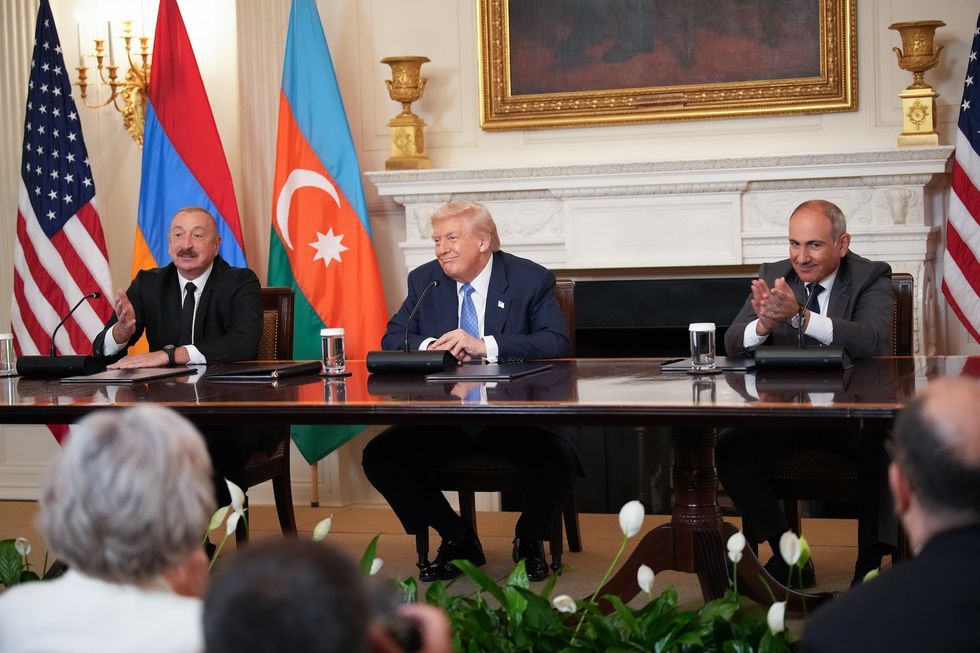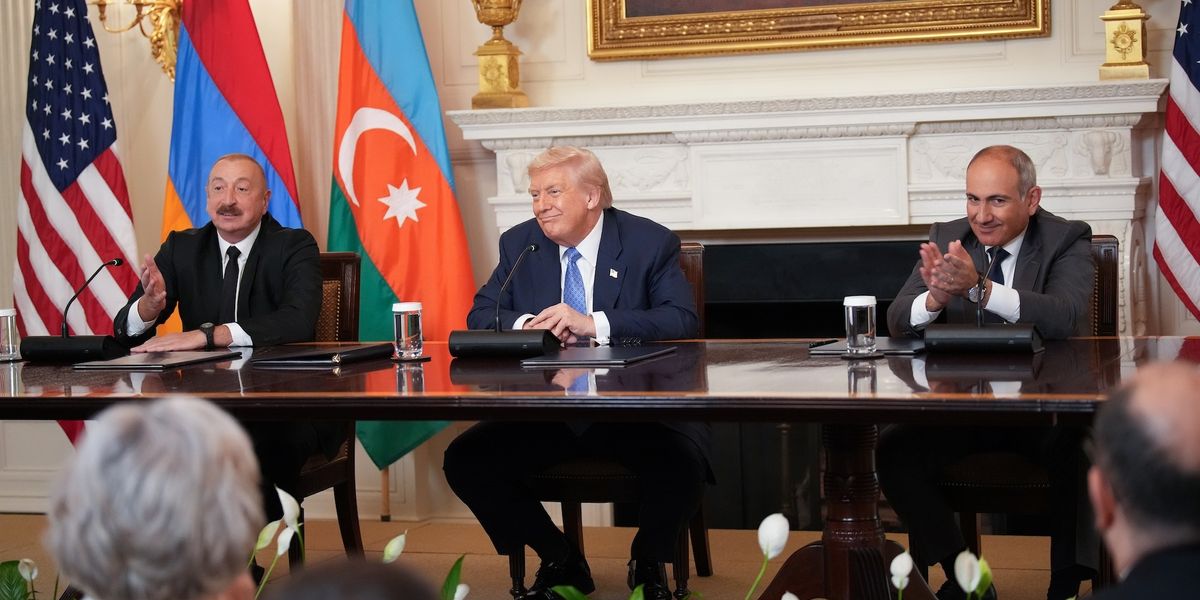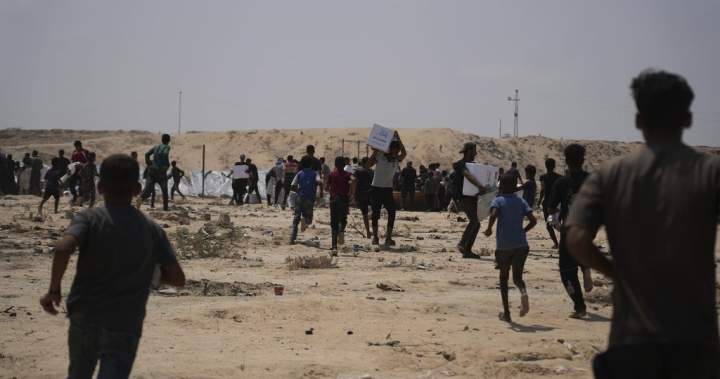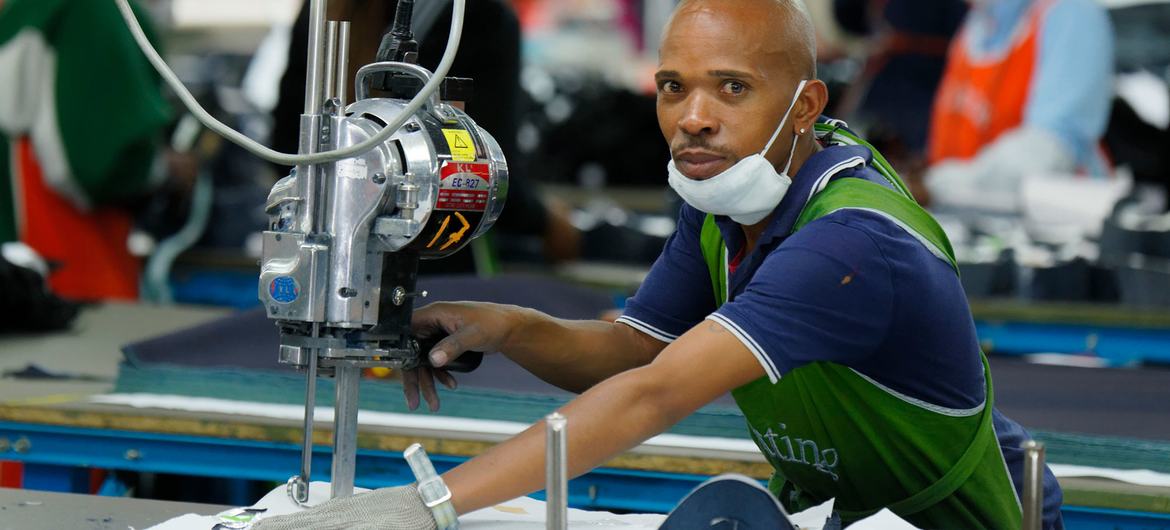
Because the two countries sit in an energy-producing part of the world shared by Russia, Europe, Iran and Turkey where the movement of oil and gas through numerous pipelines has been hampered by regional conflict.
As part of the deal, Armenia says it will provide the U.S. with exclusive development rights through a transit corridor to be named the “Trump Route for International Peace and Prosperity (TRIPP). And experts are describing the agreement as a blow to Russian President Vladimir Putin, with the possibility of a U.S. military role as peacekeepers in the region.
WHAT TO KNOW ABOUT THE AZERBAIJAN-ARMENIA DEAL
- Azerbaijan and Armenia won independence from the Soviet Union in 1991.
- Both countries have been at odds over Nagorno-Karabakh since the late 1980s when the Azerbaijani region broke away, with support from neighboring Armenia.
- U.S. officials are hoping the agreement help facilitate Azerbaijan’s entry into the Abraham Accords agreement negotiated during the first Trump administration.
- Turkey welcomed the agreement, with Ankara hoping the deal will boost energy exports.
- Critics of the deal say it gives Azerbaijan a pass on claims of ethnic cleansing in Nagorno-Karabakh.
THE INTERVIEW
In a new weekend interview series that you’ll only find at The Cipher Brief, we tapped six-time CIA Station Chief Ralph Goff to find out why the region has been pinging on his radar for the past several months and what other hot spot he’s focused on next. Our interview has been lightly edited for length and clarity.
The Cipher Brief: Why have you been tracking what’s happening between Armenia and Azerbaijan?
Goff: Part of it is the immense oil wealth that Azerbaijan enjoys. They sit right around 20th in the world in terms of oil revenues and production. That’s not too shabby for a country of 10 million people. And that oil wealth is controlled by the state. Frankly, it’s what allowed them to rebuild their military and to rebuild their capabilities. And in a pretty lightning like war a couple of years ago, they helped to retake the Nagorno-Karabakh, which was a mountainous enclave that had been occupied by Armenia. But what makes them special now are all of the meetings that have happened recently and that are continuing today. There’s a very interesting behind-the-scenes alliance between Azerbaijan and – wait for it – Israel. In fact, this probably unnerves the Iranians more than any other alliance in the region. And some of the evidence of this would be that the Iranian government publicly blamed Azerbaijan for allowing Israeli drones to be launched during the 12-day war between Israel and Iran.
And there are other suspicions that they helped enable the assassination of scientists inside Iran by Israeli operatives. Any kind of ties between this Azerbaijan, which is home to 10 million people who are Shia Muslim, much like Iran, unnerves the Iranians not just because of any kind of technical or intelligence cooperation, but there’s a sizable Azeri minority in the western part of Iran. So, there’s a great potential for Azerbaijan to stir up a lot of unrest in that part of Iran.
Also, the Azeris have quietly been forging stronger ties, not just with Turkey, which has been kind of a mentor there for the last few decades, but they’ve also increased their energy supplies to Europe. Some of the places that they supply now through the southern gas corridor include be Western Europe. So, as we look to wean Europe off of Russian gas, Azerbaijan has offered a great alternative. And they’re already supplying gas through these pipelines that run through Turkey and into southern Greece and supplying gas to Ukraine. And now that Azerbaijan has come out recently and announced their support for Ukraine, they’ve really angered the Russians.
So, not only are they unnerving Iran, but now they’re angering the Russians. And there are several reasons for that. One is that you had Russia kind of abandoned Azerbaijan when it sought to retake Nagorno-Karabakh in their war. And the Azeris hadn’t forgotten that. But the Russians were kind of tied up with their own war of their own making in Ukraine. And at the same time, the Azerbaijanis have been supplying fuel to Ukraine expressing support for them and then reducing purchases of Russian military equipment. So, all of these moves show that Azerbaijan is moving slowly away from Russia, which offers the West a great pressure point, another pressure point on Russia in terms of rolling back Russian influence in the area. Azerbaijan is next to Armenia, which is also becoming restive under Russian influence.
The Cipher Brief: The opportunity that that could present for the US seems significant.
Goff: There’s a great opportunity here for the West, for Europe, for NATO, and for the U.S. to roll back Russian influence. So far, Russian hasn’t really done much with Azerbaijan and they kind of have a weak history there because as you know, the Russians shot down a civilian passenger liner in Azerbaijan earlier this year. It was during a drone attack in an area – I believe in Chechnya.
Putin never really apologized for it. He gave kind of a half-baked apology that was more of a brag and more of a threat to Azerbaijan than anything else. And that seems to have been an emotional last straw for the Aliyev government in Azerbaijan, who immediately after that really started weakening their ties to Russia. ,So there’s an opportunity for the West here to not just roll back Russian influence in Azerbaijan, but also in neighboring Armenia, where the Russians, by the way, have sought to station more troops. They have at least one or two military bases on Armenian territory. But the Armenian government has become increasingly restive under these ties with Russia, because they see less economic benefit for them and more economic loss by staying with Russia. If Azerbaijan can be peeled off and Armenia can be peeled off, then there’s a great chance for the West with the Republic of Georgia as well.
The Cipher Brief Threat Conference is happening October 19-22 in Sea Island, GA. The world’s leading minds on national security from both the public and private sectors will be there. Will you? Apply for a seat at the table today.
The Cipher Brief: I think you’re helping us all understand via a CIA mindset, why sometimes a small country that isn’t in the headlines every day really does have an impact on broader U.S. strategy overseas. But there’s another place pinging on your radar of late, Ralph.
Goff: Let me just throw in one last Azerbaijan comment. And this is kind of ties us to the West Bank because it seems everything eventually ties to the Middle East. There were reports of meetings between the leader of Syria, Al-Jalani, and the Israelis in Azerbaijan brokered by the Azerbaijanis. Not direct meetings between the leaders, but through their proxies there in countries. So, there’s a role for Azerbaijan to play in the Middle East as well.
Turning to the Middle East now. Everyone of course is following the horrific events in Gaza, following the results of the Israeli war machine activities against Hezbollah and then with a little help from the U.S., the damage done to Iran’s nuclear sites. Now, we have a situation in the West Bank that I think people need to watch, because if everyone thinks that Gaza can be the spoiler for peace and prosperity in the Middle East, the West Bank is no less. It’s just lesser in the headlines.
What we have in the West Bank is a combination of the Israeli government’s failure to hold back the extremist Israeli settlers who are literally seizing land, burning farms, destroying crops, and killing Palestinians. We have a tragic combination where you have Americans – blue passport holders – living in the Israeli settlements and Palestinian Americans living in the West Bank. So, there is a reason for the United States to pay attention to this as the settlers have been left to pretty much impose their will.
The IDF either stands by or in some cases, is complicit because a lot of these reservists come from Israeli settlements. I think we really need to watch the West Bank and if we see a situation where it is effectively annexed by Israel, that really can throw a spoiler into the entire region, particularly when you have the Europeans right now looking at recognizing Palestine and the two-state solution.
Palestine is already recognized by 147 out of 193 UN member states but now when you have Britain and France who are on the UN Security Council and both are expressing their intent to join with Russia and China who have already recognized Palestine on the UN Security Council so this really portends a lot more pressure on the Israeli government and the West Bank.
If the West Bank erupts into another bloody intifada and if the IDF operates in the West Bank like they operate in Gaza, if people think there’s pressure being put on Israel now, they haven’t seen anything yet.
The Cipher Brief: I’d like to talk about Moldova now, where the president is warning of unprecedented Russian election meddling. We know that Russia has been working through multiple gray zone type channels in Moldova to exert more Russian influence into the region. Cipher Brief COO Brad Christian and I were in Ukraine, more than a year ago, when there was intelligence that Russia was getting ready actually to launch a coup and just take over the government completely. When you think about this new warning now from Moldova’s President, what are the things that flash red for you in terms of Russia’s intentions and maybe even it’s timeline?
Goff: What flashes red for me is the potential for another NATO member state to be plucked from the anti-Russia coalition and put into the pro-Russia coalition, as it were. They’ve had elections in Moldova, similar to Romania, where the results have been close. But Moldova is an economically weak member of Europe and is very dependent on the largesse of Europe as it were. They are militarily weak. They’re also a key strategic location since they border Ukraine to the south. So, if Russia were able to pluck Moldova out of the circle of an anti-Russian coalition, that would be a big win for Moscow. So, the Russians are going to spare no expense on that. They’ve made a lot of headway and the Moldovans are right to warn the West.
If we look at Romania, the pro-Western party hung on there, but it took a lot of political maneuvering and frankly, it took some decisive acts by the government – some would question the legality of some of that – to remain in power. But at the end of the day, they did. And if they’ve held the Russians off for now, you have to remember that Moldova is a much weaker state and is much less capable of protecting itself from the predations of Russian information warfare. This is really not just a warning, it’s a three-alarm fire warning. So, the West really needs to pay heed and we really need to find ways to assist the current government there, both economically and politically.
Need a daily dose of reality on national and global security issues? Subscriber to The Cipher Brief’s Nightcap newsletter, delivering expert insights on today’s events – right to your inbox. Sign up for free today.
Are you Subscribed to The Cipher Brief’s Digital Channel on YouTube? There is no better place to get clear perspectives from deeply experienced national security experts.
Read more expert-driven national security insights, perspective and analysis in The Cipher Brief because National Security is Everyone’s Business.
<




